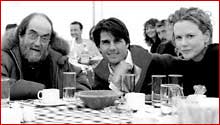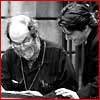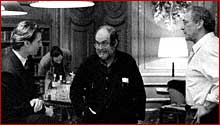|
DF: Since we are on the topic of contentious debates, another
issue for fans has been the lack of anamorphic enhancement of the
1.66:1 titles. Since it is possible to "windowbox" a 1.66:1
title and anamorphically encode it on DVD, and it would render slightly
improved resolution (on 16x9 monitors) versus a straight 1.66:1
non-anamorphic letterbox transfer, why not do it?
LV: 2001 is the only title that is "16x9 enhanced."
With the 1.66:1 titles, it is simply because it (anamorphically
encoding them) alters perception.
DF: How so, exactly? I think this might be a hard concept for
some to grasp...
LV: How can I explain this? Well, here's an analogy. Very
early on - and you'll see this in the documentary (A Life In Pictures)
- on one of the very first features Kubrick made, Killer's Kiss,
he had an argument with his director of photography on the film,
Lucien Ballard. Stanley had set up a tracking shot with a 25mm lens
and told him what he wanted. Then he later he came back and the
tracks had been moved back, quite a ways from where he set them
up, and he asked Lucien what he was doing. Lucien said he was "giving
him exactly the same coverage you wanted, but with a 50mm lens which
makes my job quicker and faster." But Stanley said, "What
about this change in perspective?" And Lucien's reply was that
t it doesn't matter that much. Which is wrong. Maybe perspective
doesn't m after much to someone who is just watching a movie for
fun, but for Stanley, that slight alteration, that change, means
everything. It is the same as those who get angry because The Shining
or Clockwork Orange aren't being displayed in 1.85:1. Well, he didn't
want that, he wanted 1.66:1, or full frame. End of story. (laughs)
And originally (when video transfers were done) there was no windowboxing
or anamorphic, so it would have been speculation on my part if I
had done that, anamorphically encoded the 1.66:1 titles. I stuck
to everything Stanley wanted according to his exact specifications
all the way through our working relationship.
DF: So what you're saying is that, in a way, windowboxing a
1.66:1 image thus forces the image to occupy a different space within
the video frame, thereby altering a viewer's relationship to the
composition?
LV: 2001 is another example. In the cinema, by keeping the
original aspect ratio of 2001: A Space Odyssey at 2.20:1, it gives
you the height you wouldn't have had at 2.35:1. And we wanted to
keep that original height just the way Stanley shot it, even if
it may seem so minor to some people. Better that than squeeze it
down to 2.35:1. These are choices Stanley was quite clear about,
so there was no question at all about them in my mind.
DF: When preparing these new remasters, are you going "all
the way" in terms of high def? If I understand it, the full
frame titles like The Shining and Full Metal Jacket are being transferred
in high-def, too. Meaning, a 1.33:1 image is being centered in a
1.78:1 frame, and there are not alternate 1.78:1 "matted"
high-def transfers being made. With high-def broadcasts becoming
more common, is there a chance we'll see these new Kubrick titles
in full high-def resolution? Or a theatrical re-release?
LV: You know, I don't know. The work has been done with
all the titles with a view towards a smooth transition to high-def.
All have been transferred that way. So far as we're concerned, there
is nothing that anybody needs to do more to these movies one way
or another, whether for a theatrical re-release or the video and
broadcast markets.
But I will say one thing, he (Kubrick) did look forward to the
day when there would be a thing called a "dry lab" as
opposed to a "wet" one. (Editor: One based on a chemical
process like film.) Digital projection was something he was
very interested in. And although he loved film, wet laboratories
are very unpredictable - you can time something and put it through
say a printing process and it can change it. It can make it more
heavy, more dense, more dark, too light, too washed out, or the
reds can come out too strong, or what have you. So he was very excited
about the idea of digital projection, because you could work with
much more precision. That is why we had to check every print that
came out of the laboratory to make sure it was correct, which was
very time consuming.
DF: Let's talk about supplements. Aside from The Shining, none
of the titles in the previous Kubrick Collection had any real "extras."
LV: When The Making Of The Shining was shot, I think you
can honestly say you hadn't seen a documentary the making of the
film in that way, in that form or that style. I think it still stands
up.
DF: Along with his presupposed hatred of widescreen and surround
sound, did Kubrick also hate supplements? (laughs)
LV: Well, Stanley wanted to do this originally - well, I
was going to say just before he died but everything is just before
he died - around November of 1998. Warner came to him and asked
him if they could use "The Making Of The Shining" because
it had been around for years, and it was one of those things were
Stanley suddenly realized it was there, and it had not been released
in video format. It was originally done for British television.
I suppose you could say part of the reason he agreed was for posterity,
and because his daughter (Vivian Kubrick, who directed it) is very
talented. But he also wanted to release it because he realized it
was a good little film. If it hadn't been good, he would never have
let it go out on the DVD.
DF: It is interesting, because some other studios aside from
Warner are now starting to "load up" their Kubrick titles
with extras, though they didn't seem to have involved Kubrick directly...
LV: We did not like what they call "supplementary material."
Stanley was aware that people don't go into a store and refuse to
rent or buy a video because there isn't extra stuff on there. They
buy or rent it because they want to see the movie. And he didn't
feel that any of his movies needed anything more - the films spoke
for themselves. If they did then people would go back and look at
it again and again, and if they didn't, well then some people just
wouldn't get it, and well, too bad. (laughs)
As far as other special editions such as Criterion's Spartacus,
Stanley was only involved when they were restoring the elements.
And in actual fact it was more a question of theatrical. I know
when they were restoring Spartacus they were ringing him and asking
him what he felt about what they were doing. Stanley offered guidance
in terms of technical things, which they took, so he was contacted
on that point of view, but Stanley had no involvement with the documentation
of it. But it has already been well documented that Stanley never
really felt like it (Spartacus) was really his film. So he wasn't
really involved.
DF: Well, my cue is coming to wind this up with one last question,
which is always the hardest. Can you tell me what your first meeting
with Kubrick was like?
LV: I first met him in 1973. My first meeting with Kubrick
I auditioned as an actor for what would become Barry Lyndon. You
never met Stanley on auditions; he would send you text you had to
learn and videotape it and it would be sent back to him. It was
only after four or five months after I was told that I had gotten
the role that I went over to shoot. We had gotten to the hotel and
it was packed, and I had a tap on my shoulder, and I turn around
and there's this guy, vary quiet, and he says "Hi, I'm Stanley."
And that was it. (laughs) No fanfare, no sort of buildup, no cloud
of smoke. He was very gentle, very natural.
Of course not. But it was during that time that I think I worked
on four or five movies, but it was only after working with Stanley
that I began to realize that I'd rather work in production. I had
seen 2001, I had seen A Clockwork Orange, so I was a huge fan. To
get to work as an actor in Barry Lyndon was a dream come true. To
get to meet the man who, if I asked a question, took the time to
explain to me about lenses, about cameras, all that sort of thing.
I just got so interested that I decided to work in production. And
it was after that he offered me a job in The Shining.
DF: I bet, way back then, you never thought you'd be here, doing
this today and talking to me...
LV: No, absolutely not!
Special thanks to Ronnee Sass and all at Warner
Home Video, and Karen Penhale and all at Carl Samrock PR. And
very special thanks to Leon Vitali and Jan Harlan. All Images
courtesy Warner Bros. All rights reserved.
|




